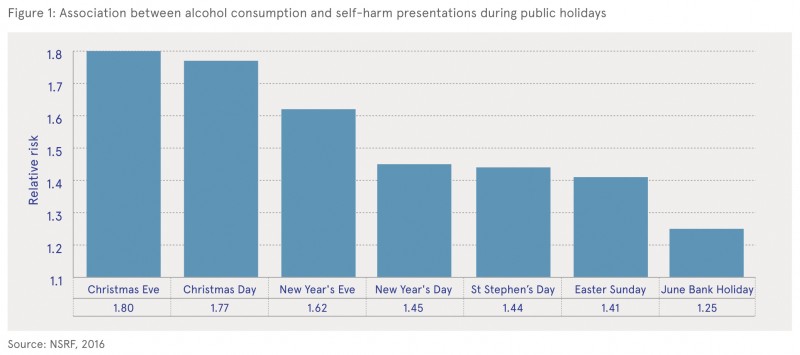Millar, Sean (2017) Self-harm, alcohol consumption and public holidays. Drugnet Ireland, Issue 62, Summer 2017, p. 20.
| Preview | Title | Contact |
|---|---|---|
|
PDF (Drugnet issue 62)
700kB |
Research presented at the National Health Services Research Institute Research Day1 by Dr Christina Dillon of the National Suicide Research Foundation (NSRF), which has recently been published in the Journal of Affective Disorders2, highlights the effect of alcohol consumption on self-harm presentations to Irish hospital emergency departments during public holidays.
The National Self-Harm Registry Ireland has consistently shown peaks in self-harm presentations out of hours at weekends and during public holidays. Presentations involving self-harm peak around midnight, and approximately one-third of presentations are recorded on Sundays and Mondays. Over recent years, peak attendances have been observed on public holidays. During the period 2007 to 2015, the mean number of self-harm presentations was 27 daily and 32 on public holidays. Across all years, St Patrick’s Day and New Year’s Day showed higher numbers of presentations compared to other public holidays, with a yearly average of 44 and 41, respectively.
It was found that alcohol was involved in 43% of self-harm presentations on public holidays compared to 38% on all other days. Self-harm presentations had a 24% increased likelihood of involving alcohol on public holidays compared to all other days (relative risk: 1.24, 95% CI: 1.17‒1.32). In addition, self-harm presentations to hospital on Christmas Eve, Christmas Day and New Year’s Eve had a 80%, 77% and 62% increased probability of involving alcohol, respectively (Figure 1).

The NSRF concludes that the findings support the hypothesis that self-harm presentations are elevated on public holidays and that alcohol consumption is more strongly associated with self-harm presentations on public holidays.
These findings highlight the need for continuing efforts to:
- Enhance health service capacity at specific times.
- Increase awareness of the negative effects of alcohol misuse and abuse.
- Educate self-harm patients and their families about the importance of reduced use of, and access to, alcohol.
- Arrange active consultation and collaboration between the mental health services and addiction treatment services in the best interest of patients who present with dual diagnosis (psychiatric disorder and alcohol/drug abuse).
- Ensure the assessment of alcohol misuse and abuse is a structural part of the assessment to determine the risk of repeated self-harm and suicide.
1 National Suicide Research Foundation (2016) Self-harm, alcohol consumption and public holidays. National Suicide Research Foundation newsletter, 15: 2. Cork: National Suicide Research Foundation. https://www.drugsandalcohol.ie/26645
2 Griffin E, Dillon CB, O’Regan G, Corcoran P, Perry IJ, et al. (2017) The paradox of public holidays: Hospital-treated self-harm and associated factors. Journal of affective disorders 218: 30-34.
A Substance use and dependence > Prevalence > Substance use behaviour > Alcohol consumption
B Substances > Alcohol
F Concepts in psychology > Behaviour > Risk-taking behaviour
F Concepts in psychology > Behaviour > Self-destructive behaviour / self-harm
VA Geographic area > Europe > Ireland
Repository Staff Only: item control page